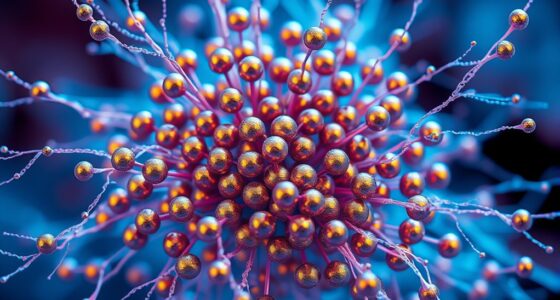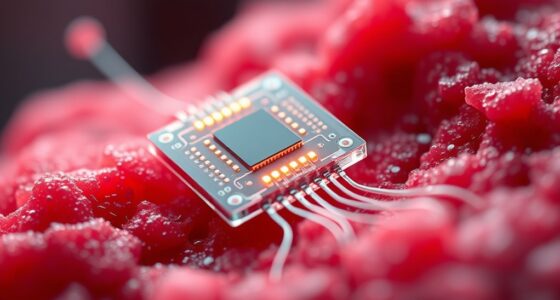AI plays a vital role in personalized nanomedicine by analyzing vast datasets to improve diagnostics, predict disease progression, and tailor treatments. It helps design and optimize nanoparticles that target specific cells, minimizing side effects and boosting effectiveness. Additionally, AI enables early detection, improves imaging, and continuously learns to refine therapies. If you want to discover how these innovations come together to transform healthcare, keep exploring this exciting field.
Key Takeaways
- AI analyzes complex patient data to tailor nanomedicine therapies for individual biological profiles.
- It optimizes nanoparticle formulations for precise targeting and improved treatment efficacy.
- AI predicts nanoparticle behavior, ensuring effective delivery to specific cells or tissues.
- It enables early diagnosis and personalized intervention by interpreting medical imaging and genetic data.
- AI integrates diagnostics with nanoparticle-based treatments for faster, customized, and adaptive therapies.

Have you ever wondered how artificial intelligence is transforming personalized healthcare? The answer lies in its ability to analyze vast amounts of data quickly and accurately, enabling tailored treatments for individual patients. One of the most exciting developments in this field is the use of AI-driven diagnostics combined with nanoparticle targeting. These innovations are revolutionizing how you can detect and treat diseases with unprecedented precision.
Nanoparticle targeting allows you to deliver drugs directly to specific cells or tissues, minimizing side effects and increasing treatment effectiveness. When paired with AI, this process becomes even smarter. AI algorithms analyze imaging data, genetic information, and other patient-specific details to identify the most effective nanoparticle formulations for each individual. This means treatments are no longer one-size-fits-all but are customized based on your unique biology. The AI system continuously learns from new data, improving its targeting accuracy over time, which leads to more precise therapy delivery. As a result, you benefit from faster diagnosis, better outcomes, and fewer adverse reactions.
AI-driven diagnostics play a pivotal role in this personalized approach. Instead of relying solely on traditional tests, AI interprets complex data from medical imaging, blood tests, and genetic sequencing to detect diseases at an earlier stage. This early detection is essential because it allows you to start treatment before symptoms worsen, considerably improving prognosis. The AI algorithms can spot subtle patterns in data that humans might miss, providing a level of insight that enhances diagnostic accuracy. This means you get a clearer picture of your health status, allowing for interventions tailored specifically to your condition.
Furthermore, AI enhances nanoparticle design by predicting how different particles will behave inside your body. This predictive capability ensures that the nanoparticles target the intended cells more effectively, increasing the success rate of treatments. It also helps in designing nanoparticles that can carry multiple therapeutic agents or imaging markers, enabling simultaneous treatment and diagnosis—what’s often called theranostics. This integrated approach allows you to receive more complete care, with fewer procedures and better monitoring of your progress. Additionally, incorporating advanced materials from fields like nanomedicine enables the creation of more effective and biocompatible nanoparticles, further improving treatment outcomes.
Frequently Asked Questions
How Does AI Improve Nanomedicine Targeting Accuracy?
AI improves nanomedicine targeting accuracy by utilizing machine learning algorithms that analyze complex biological data. You can optimize drug delivery systems, making them more precise in reaching specific cells or tissues. Machine learning helps predict how nanocarriers interact with the body, reducing off-target effects. This technology allows you to personalize treatments, enhancing efficacy and safety, ultimately ensuring that nanomedicine delivers drugs exactly where they’re needed most.
What Are the Main Challenges in Integrating AI With Nanotechnology?
You face challenges integrating AI with nanotechnology, from regulatory hurdles to manufacturing scalability. Coincidence brings these issues together, as strict regulations slow innovation, and scaling up production proves complex. You must navigate safety standards, guarantee consistent quality, and develop robust algorithms. Balancing technological advancement with compliance tests your ability to innovate efficiently, making it essential to address these hurdles proactively to fully realize personalized nanomedicine‘s potential.
How Is Patient Data Privacy Maintained in Ai-Driven Nanomedicine?
You maintain patient data privacy in AI-driven nanomedicine by implementing robust data encryption, guaranteeing sensitive information stays protected. Additionally, you manage consent carefully, making sure patients understand and agree to how their data is used. Regular audits and strict access controls further safeguard privacy. By combining encryption and consent management, you ensure ethical practices while harnessing AI’s power to personalize nanomedicine effectively.
What Ethical Concerns Arise From AI in Personalized Nanomedicine?
You should be aware that ethical concerns in AI-driven nanomedicine include guaranteeing informed consent, so patients truly understand how their data and treatments are used. Algorithm bias is another issue, which can lead to unequal treatment or misdiagnosis. As you navigate this field, it’s vital to address these concerns proactively, promoting transparency and fairness to protect patient rights and uphold ethical standards.
When Will Ai-Enabled Nanomedicine Become Widely Available?
You’ll likely see AI-enabled nanomedicine become widely available within the next decade, once market readiness improves and regulatory hurdles are cleared. For example, imagine a future where personalized nanobots target cancer cells precisely. Currently, challenges like ensuring safety and establishing standards delay progress. As researchers address these issues and regulations adapt, you’ll see these advanced treatments become accessible to many patients, transforming healthcare.
Conclusion
So, as you marvel at AI’s ability to customize nanomedicine, remember it’s quietly turning you into its next data point. While you think you’re in control of your health, AI’s algorithms are busy designing tiny particles that target your cells—without your say. Ironically, in this future of personalized care, the real personalization might just be AI’s relentless mastery over your body’s most secret secrets. Welcome to the era where you’re the patient and the product.









